
Recently on Cyclingnews.com |
Tech Feature: USA Cycling Race Mechanics Clinic, February 12, 2007
USA Cycling trains the next generation of race mechanics
USA Cycling's Race Mechanics Clinic claims to be the world's only race support mechanic training program, held annually in Colorado Springs, CO. Cyclingnews Technical Editor James Huang throws himself into the mix to see what it takes to be among the people that keep the riders rolling along behind the scenes.
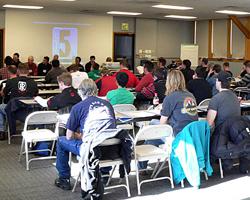
|
Imagine a job that involves copious amounts of travel, extraordinary levels of stress, and minimal pay. On top of that, you are also working under intense pressure for some of the most demanding clients in the world, and on some occasions, the brunt of their failures may fall squarely on you. You haven't been home in weeks, all of your bills are perpetually late, and your feet are now aching to the point where you can't even feel them anymore. Now picture that it is also 3 o'clock in the morning, and although you've been hard at work for the past 21 hours, you still have more to do before beginning the next day.
Sounds peachy, doesn't it? Without any additional information, that description would likely garner about as much of a response on Monster.com as, "Iron Maiden Tester; applicant should be thick-skinned, health insurance not offered. Temporary position." Yet in spite of the bleak picture painted here, Dave Arnauckas has been happily doing just that for over a dozen years, and nearly fifty people were recently on hand in Colorado Springs, CO, eager to learn how to do the same thing.
Thank you, sir; may I have another?
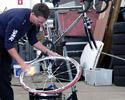
|
Arnauckas was one of 16 of some the world's most elite bicycle mechanic gurus that had volunteered their time to instruct the USA Cycling Race Mechanics Clinic in early January at the Olympic Training Center in Colorado Springs, CO. Arnauckas himself is a long-time race mechanic as well as a former graduate of the program, but is also supervisor of Shimano's Multi-Service neutral support program. When asked why he and others have opted for this path in life, he related a story from his days with the Volvo/Cannondale mountain bike team in the '90s when Alison Sydor rolled across the line in second place at the final World Cup race in Houffalize, Belgium, where she secured her second World Cup title.
"She came across the finish line, rolled up to us (the team manager, soigneur, and himself), then handed me the bike and, I'll never forget it, she said, 'it's great to have all the confidence in the world in your equipment.' To know that she had 100% confidence in her equipment, to see her accomplish her goal and see her come across the line as the best in the world is indescribable. If they succeed, I succeed."
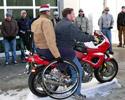
|
Arnauckas doesn't deny that the job involves a great deal of hardship with little in the way of monetary gain, but in his words, he is "living the life", for which there has been no substitute. Other instructors such as Bernard Kocis, former team mechanic for the T-Mobile women's team and now with Webcor, TJ Grove, team mechanic for the U23 National Team, and Chip Howat would also have it no other way. As Kocis put it, "As a mechanic, you have a unique ability to affect someone's performance in a positive way."
In total, the group of instructors represented a number of varied cycling backgrounds and disciplines, and when you consider that they have collectively attended a number of Olympic Games, multiple Tours de France, and countless UCI World Cup and US National championships all around the world and have influenced some of the biggest results in cycling, the 'Race Mechanic' job description suddenly becomes much more appealing.
Glue and grease
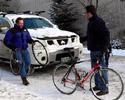
|
USA Cycling began its Race Mechanics Clinic in the late '80s, and used to conduct two classes per year in order to meet the demand. Currently, USAC only holds the clinic annually, but the class sizes haven't changed much and there is still usually more demand than there are seats. To date, the program has produced approximately 700 graduates, nearly 300 of which are still current race mechanic license holders.
The most recent batch of attendees were primarily bicycle shop employees from all reaches of the United States. Although most of them already possessed copious amounts of mechanical experience in that environment, the role of a race mechanic and the requisite skills involved are distinctly different from its brick-and-mortar-bound counterpart. In theory (yes, I said in theory), shop mechanics generally have the correct replacement parts, appropriate tools and work areas, as well as a reasonable amount of time to perform the needed work.
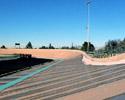
|
In contrast, race mechanics typically have more limited access to components (at least in the 'I have it here right now' sense), must sometimes make do with tools that were not meant to do the job at hand, and often have virtually no time at their disposal and are working in less-than-ideal conditions. For example, let's say one of your riders is on a solo breakaway and snaps his chain 5k from the line, but all you have is a wad of chewing gum and a frayed shoelace... what do you do? Ok, fine, unless your name is MacGyver you probably can't do much of anything given those kinds of resources (maybe tell him to start running?), but you see my point.
According to one instructor, "the race mechanic is the glue that holds everything together as well as the grease that keeps everything running smoothly." Whether or not everyone on a team would agree with that statement verbatim is one thing, but few would argue that the mechanic serves a critical function, and their role is not always strictly limited to mechanical duties. As instructor Andy Stone put it, "When preparation meets opportunity, you win." Obviously, the rider is still the key and there isn't much a mechanic can do to turn the tides of luck and chance, but no amount of training is worthwhile if the rider can't make it to the finish line as a result of an equipment failure.
Covering all the bases
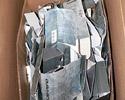
|
In spite of the focused nature of the curriculum, only roughly one-third of this year's class expressed an ultimate goal of working the US National program, ProTour circuit, or similar venue. The rest were hoping to merely polish their skills, or were looking to give their local shops an edge over their competition. Most interesting, however, was that about half of the class paid their own way for the clinic (others were shop-sponsored). Considering the US$250 clinic registration fee (which included food and lodging on-site at the OTC), the cost of transportation to get to the event (most flew), plus the typically unpaid time taken off of work as well as the usual bicycle shop employee salary, it was clear that many of these students were highly motivated to be there.
Thankfully, clinic attendees received more than their money's worth of information, instruction, and guidance that covered a broad list of topics. Over 40 hours of classroom and hands-on training were packed into four consecutive days, and two of those days spanned nearly 14 hours from start to finish. In addition, the hectic schedule left little room for the study time that was needed in order to complete the exams that were to be submitted at the end of the clinic. Subjects included, but were not limited to, the following:
- - Neutral and team support for road, track, and mountain bike events (including
stage race, criterium, time trial, and circuit race);
- - Technical issues such as bicycle component and frame materials, proper
setup and troubleshooting of power meters, suspension tuning, and correct
methods for gluing tubular tires;
- - Skills uniquely required in race environments such as wheel changes, rider position measurement and recording, packing and transport of equipment, and even required domestic Department of Transportation rules and regulations that must be followed when driving certain types of support vehicles.
As if that were not enough, students were also presented with the required information to become certified and licensed USAC race officials. When all was said and done, 46 students became licensed and certified USAC race mechanics (including yours truly). USAC offers a list of this most recent group of graduates, as well as a current list of all active Mechanics license holders, on its web site. Both of which may be accessed by groups such as race organizers and promoters, local clubs, and visiting teams when seeking neutral support or additional mechanical staff for an upcoming event. Whether or not one of these names shows up in the back of a Mavic or FSA neutral support vehicle or team car remains to be seen, but the USA Cycling Race Mechanics Clinic at least ensures that there is a continuous pool of qualified people from which to choose to keep the peloton rolling.
Photography
For a thumbnail gallery of these images, click here
Images by James Huang/Cyclingnews.com
- Nearly fifty students participated attended the latest running of USA Cycling's Race Mechanics Clinic.
- USA Cycling holds its Race Mechanics Clinic at the Olympic Training Center in Colorado Springs, CO.
- Among the most valuable skills for a race mechanic is a fast wheel change, and students were given plenty of opportunity to practice.
- Wheel changes were performed from the back of a support car as well as from a motorcycle and neutral pit.
- Ken Whelpdale of USA Cycling rolls in with a double flat.
- Race mechanics condense an entire wall's worth of tools into a airline-approved case.
- Does this resemble your recycling pile?
- Chip Howat is a professor at University of Kansas but is also among the foremost experts on tubular glue properties and gluing procedures.
- While shop employees comprised the vast majority of attendees, others included members of the industry such as Jeremy Clay of Reynolds Cycling.
- Tubular gluing is not a subject to be taken lightly, and it was given ample attention during the clinic.
- Dave Arnauckas of Shimano Multi-Service demonstrates proper bicycle washing technique.
- Mike Hall of SRM discusses power meter setup and troubleshooting.
- Colorado Springs is also home to one of the premier ourdoor velodromes in the country.
- Looking down the back straight into the 35° banking of Turn Three.
- Australian company Teschner Technologies Group may be the official track bicycle supplier to USA Cycling next year.
- A row of Mavic Io carbon fiber front wheels await their next run around the track.
2007 USA Cycling Race Mechanics Clinic graduates:
Anderson, Benjamin P.
Barrientos, David
Brow, Jeffery
Byle, Todd
Campbell, Jeff
Chambers, Reid T.
Clay, Jeremy
Corbalis, Benjamin
Cross, Gregory
Cross, Patrick
Cruger, Thomas
Diamond, Kevin P.
Dickson, Chris
Feldman, Richard
Fetterhoff, Chad
Gurney, Brian
Hamer, Peter
Hill, Elizabeth Morse
Howell, Austin
Huang, James
Jenson, Tom B.
Kingsbury, Justin
Kosienski, Carlos
Labosier, Joel E.
Maienza, Matt
Martin, Chuck
McClure, John
McFarland, Jim
Murray, Ian
Pfaff, Nathan
Phillips, Daniel
Ralph, Max
Russell, Jeremy B.
Rybak, Brian James
Saletel, Eric J.
Shuttles, Erik
Sloan, Eddie
Smith, Wilson J.
Souers, Mike
Speckman, William
Sperling, Steven
Sunderman, William
Trujillo, John
Wagner, Ray
Walsh, Ryan
Wielgasz, Bryan

